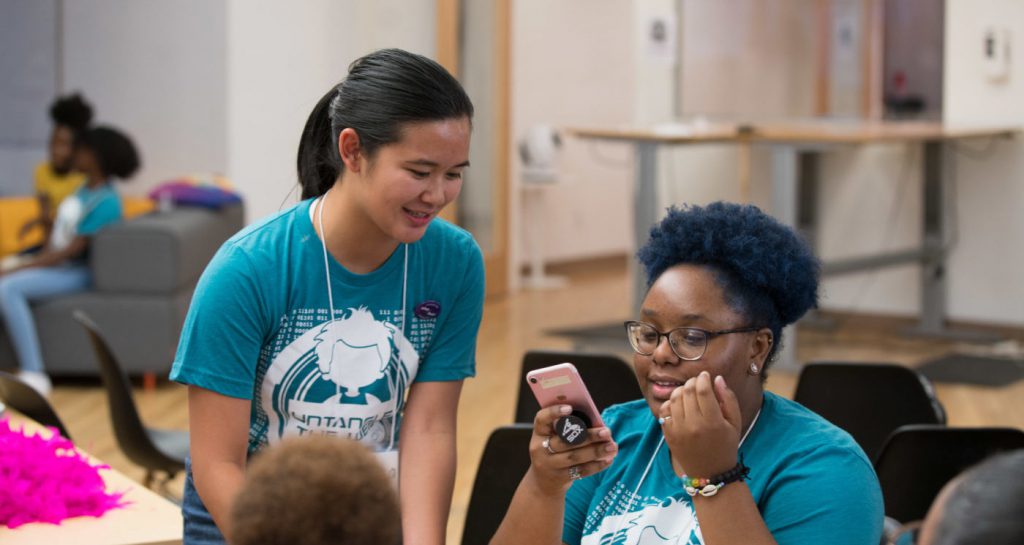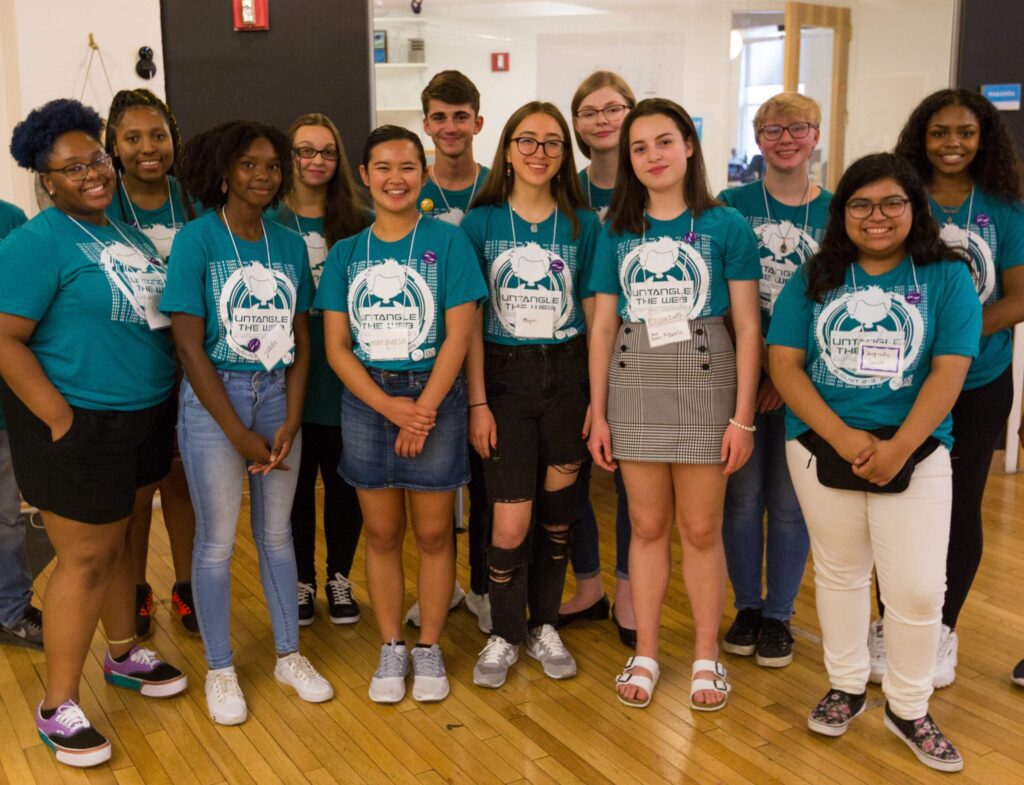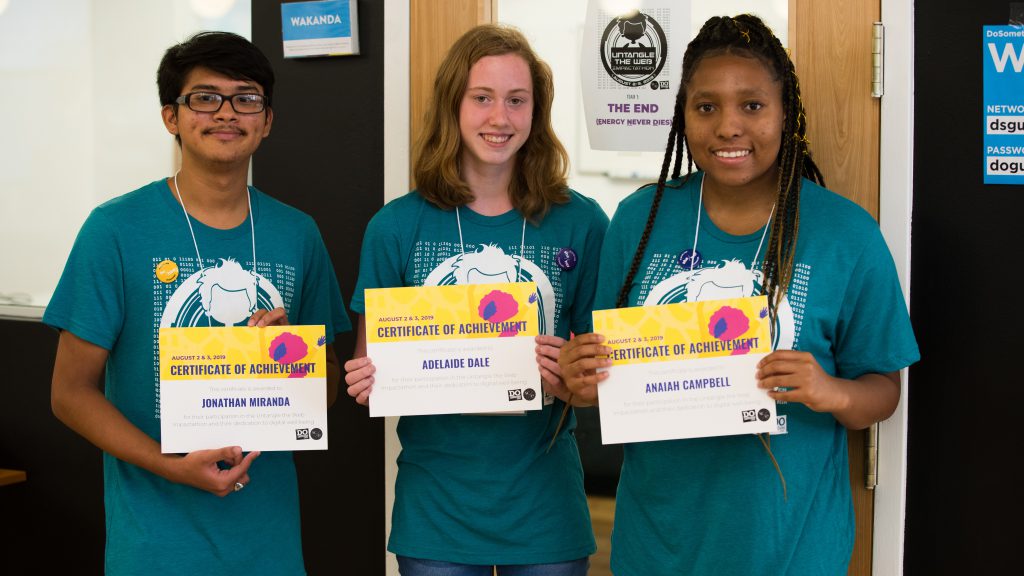RT Youth Power Fund Selects New Cohort of Youth Leaders
2025 Cohort will be backed by $2.4 million in funding to shape a safer digital ecosystem
February 5, 2025 — Today, the Responsible Technology Youth Power Fund (RTYPF) announced $2.4 million in funding to support 18 youth and intergenerationally-led organizations working to create a safer and more equitable digital ecosystem. This is RTYPF’s second year of investing in the youth-led responsible technology movement, and its newest cohort arrives at a crucial moment, bringing innovative solutions and fresh perspectives to enhance the future of online safety. 2025 grantees will use grant funding to advance work across a variety of issues, including tech accountability, youth mental health, responsible AI, and technology-based climate solutions.
The 2025 cohort includes young advocates responsible for raising awareness of the Kids Online Safety Act and censorship of women’s health ads and information on social media platforms, and four individuals recognized by Forbes’ 30 Under 30 for their work across social media and AI. In a first, the fund is led by an intergenerational steering committee that spearheads strategic planning, grantee selection and programming decisions. RTYPF’s Young Leader Advisors (YLA) are key decision-makers, differentiating this grantmaking approach as youth-led and youth-driven.
“As a generation raised by technology, we believe that young people are essential to building a more responsible and humane technology future,” said YLA grantee Trisha Prabhu, Founder and President of ReThink Citizens, “We have a unique perspective shaped by growing up in a digital world – and that drives our commitment to creating a better, more responsible tech ecosystem for us, our peers, and future generations.”
“We’re proud of RTYPF’s innovative model, which empowers young people to make meaningful decisions about grantee funding and support,” said Yoelle Gulko, Director of documentary film Our Subscription to Addiction, “This inter-generational approach not only unlocks new opportunities for grantees – it helps young people become leaders in the movement for a more ethical tech landscape.”
The fund’s grantees are receiving between $50,000 and $125,000 in one-year grants, which were allocated based on capacity and funding needs. The 18 organizations joining Responsible Technology Youth Power Fund’s second cohort are:
- AI Consensus (Young Leader Advisor grantee), is a student movement working to transform education through the responsible use of AI. Their mission is anchored in empowering students and engagement across stakeholders.
- Center for Intimacy Justice (renewal grantee) is a nonprofit changing tech platforms’ discriminatory suppression of women’s health information online. They lead investigations, legal actions, and multi-pronged media and advocacy strategies to change biased tech practices that censor women’s health.
- Cyber Collective’s Internet Street Smarts program (renewal grantee) is revolutionizing digital safety education through a culturally relevant, engaging approach that speaks directly to Gen Z and historically marginalized communities.
- Decifer Studio (new grantee) is a research and design studio leveraging creative technology and storytelling to demystify the socio-political workings and impact of technology, for and with the public.
- Design It For Us (renewal grantee) is a youth-led coalition advocating for safer online platforms and social media. They aim to drive and achieve key policy reforms to protect kids, teens, and young adults online through the mobilization of youth activists, leaders, and voices.
- Encode (renewal grantee) is a coalition of youth activists and change makers fighting for human rights, accountability, and justice in artificial intelligence. Harnessing a global network of volunteers from all over the United States and world, they champion informed AI policy and encourage youth to confront the challenges of the age of automation through political advocacy, community organizing, educational programming, and content creation.
- Generation Patient (Young Leader Advisor grantee) represents adolescents and young adults with chronic conditions across the United States and internationally. They focus on peer support, advocacy, and access to educational information and resources as fundamental pathways to empowerment.
- #HalfTheStory (renewal grantee) is the pioneering non-profit on a mission to empower the next generation’s relationship with technology through research, education, and advocacy.
- Innovation For Everyone (new grantee) is building a youth-led AI ethics literacy movement by sparking nuanced conversations about AI from the classroom to the board room to equip the public, and especially youth, to think critically about the sociotechnical impacts of AI and their role in re-envisioning a more equitable and just digital world.
- The Los Altos Institution‘s (new grantee) mission is to give youth around the world the opportunity to conduct academic research, regardless of their socioeconomic status. They connect students to research professionals and fund their projects in order to help develop the thinkers of tomorrow.
- Our Subscription to Addiction (Young Leader Advisor grantee) is a documentary that captures a young filmmaker’s raw and vulnerable experience with phone addiction. After hitting rock bottom down the YouTube rabbit hole, she is determined to repair her relationship with her phone and reclaim her life by finding her voice in a growing youth-led digital well-being movement.
- Paragon Policy Fellowship (new grantee) provides college students with real policy experience while building tech capacity for state and local governments.
- People’s Public Lab (new grantee) is bridging the gap between research and community through their community-led projects that empower and amplify people who have faced historical and systematic oppression, displacement and other forms of social injustice.
- ReThink Citizens (Young Leader Advisor grantee) leads with a mission to tackle cyberbullying and foster digital literacy by equipping all youth with the tools and education they need to safely take on today’s digital world.
- Rooted Futured Lab’s (new grantee) mission is to address the systemic neglect and exclusion of environmental justice in technology development and application.
- Seek Common Ground (Young Leader Advisor grantee) and its Student Action Network for Equity supports student organizers advancing democracy, racial justice, and education equity.
- trubel&co (pronounced “trouble and co”) (new grantee) is a tech-justice nonprofit that recruits, trains, and mobilizes the next generation to tackle social and environmental challenges using data, design, and technology.
- Young People’s Alliance Education Fund (renewal grantee) empowers young people through student-led organizing and advocacy. Their student advocates work at colleges across North Carolina, state legislatures, and on Capitol Hill to amplify youth voices.
###
About the Responsible Technology Youth Power Fund (RTYPF): The Responsible Technology Youth Power Fund is a first-of-its-kind philanthropic initiative aimed at supporting youth and intergenerationally led organizations shaping the responsible technology movement. The Fund, now in its second year, has raised over $4.5 million to support 501(c)3 eligible public charities, with award amounts ranging from $50,000 to $125,000, depending on the organization’s stage and funding needs. Learn more about the Responsible Technology Youth Power Fund and the 2025 cohort at: www.rtyouthpower.org.
The organizations partnering to invest in the fund are Omidyar Network, Hopelab, Susan Crown Exchange, The Archewell Foundation, the Arthur M. Blank Family Foundation, The Carmel Hill Fund, Enlight Foundation, AI Collaborative, Oak Foundation, Pinterest, Pivotal, and Reynolds Lookup Fund.
Nonprofit Leaders in Digital Learning Share Their Insights
What roles can data play in building effective digital learning programs for youth? How can those programs ensure that their most ambitious projects succeed? And how can your organization leverage professional development to maximize impact?
In a new webinar series on Reclaiming Digital Futures, experts from our Digital Learning partners explore these questions—and much more. These webinars are great resources for educators and nonprofit professionals interested in effective practices for equitable, youth-centered digital learning.
Watch the webinars here!
#1: Using Data to Improve Out-of-School Digital Learning Programs
#2: Creating Big, Ambitious, Collaborative Projects
#3: Professional Learning and Staff Capacity to Support Out-of-School Digital Learning Programs
We asked teens how to exercise better judgement online. Their responses blew us away.
“How might we improve people’s judgement in digital spaces?”
This was the question that guided the Untagle the Web hackathon, a two-day event we hosted this summer in collaboration with DoSomething.org. We gathered 15 exceptional young people who had expressed an interest in improving online life and asked them to develop a wireframe for a tool that would do just that.
Untangling the web
Last year, we partnered with DoSomething to develop Untangle the Web, a campaign designed to kickstart intergenerational conversations about digital life. DoSomething asked young people to take a quiz about how they used technology and media. Based on their responses, they received a digital personality and an action guide to help them start a conversation with an adult in their life. Whether a News Detective battling misinformation or a Ray of Sunshine spreading positive vibes, each young person shared an insight about their relationship with technology with a trusted adult.
Through this campaign, we aimed to reach 25,000 young people. Fifty-five thousand took the quiz.
Clearly, this project struck a chord with youth. We saw that young people recognized the effects that technology had on their lives and were desperate for resources that would help them navigate online environments.
Building on this momentum, we identified a small subset of the most engaged teens and asked them to apply for a hackathon—a two-day event where they could actually design a product that would help their peers untangle the web. We selected 15 of the most promising applicants from around the country and flew them out to New York City to participate.

Designing a mobile application to improve judgement in digital spaces. © DoSomething.org
The Hackathon
Working in small groups under the guidance of DoSomething mentors, these 15 teens developed wireframes for products that addressed our challenge question: “How might we improve people’s judgement in digital spaces?” They then presented their ideas to a panel of judges with diverse experiences in technology:
- Samarth Bhaskar, Senior Editor for Digital Transition Strategy, the New York Times
- Ross Dakin, adjunct professor of computer science, Lehman College
- Tej Gokhale, Civic Action Lead, DoSomething.org
- Jerelyn Rodriguez, co-founder, The Knowledge House
- Calvin Stalvig, Director of Youth Programming, Beam Center
We wanted to make sure our participants had plenty of space to develop their own ideas, so we only had a few requirements. Products had to be feasible, with a well-articulated problem, simple solution, and clear distinction from applications already on the market. They had to be functional, with a fleshed-out user experience. Lastly, they had to be integrated with existing online platforms.
Working in teams of three, our participants developed five product ideas:
- Thinklight: a chatroom that connects users with mental health professionals.
- ZiN: a bot that sends users daily affirmations that reinforce positive behaviors.
- VeriLegit: an application that uses existing databases to judge the accuracy of online media.
- HideOut: a service that clarifies who will see the personal information that users share.
- BullyBeeGone: a program that automatically hides and deletes abusive comments and messages on social media.

The 15 participants. © DoSomething.org
What did we learn?
This inspiring group of youth taught us so much about how young people today relate to technology. Here are our main takeaways.
- Young people want their voices to be heard. Over and over again, the young participants expressed appreciation that adults were making space for their ideas—and their leadership. Knowing that their voices are truly valued can encourage young people to get involved.
- These issues resonate with participants. The 15 young people we invited to the hackathon care deeply about online interaction. They also believe that online spaces could function better for young people—and that they’re perfectly capable of fixing them. These people were willing to spend a summer weekend working hard to make the internet better. They skipped their optional breaks to do it. And they designed five really, really impressive products.
- Diverse solutions empower more users. In the selection process, we prioritized participants that came from different geographies, races, socioeconomic backgrounds, and gender and sexual identities. This group clearly recognized that issues of online judgement don’t operate in a vacuum, and proposed solutions that took identity into consideration.
- Good online judgement means something different to everyone. We encouraged our participants to relate this topic to their own lived experiences. This allowed the cohort to focus on the specific issue or multiple issues that they felt were most pressing—and led to a diverse set of solutions. These participants didn’t necessarily agree on a single definition of “online judgement.” We think that’s a good thing. The one thing our participants did agree on? That it shouldn’t just be on them to exercise good judgement—tech companies have a responsibility to promote it.

The BullyBeeGone team. © DoSomething.org
What comes next?
Based on a set of criteria that included functionality, user experience, and potential for impact, our panel of judges selected BullyBeeGone as the official winner of the hackathon. Over the next few months, DoSomething will work with BullyBeeGone’s young designers to develop a minimum viable product (MVP) that will bring this great idea one step closer to the market. We’re excited by BullyBeeGone’s potential and thrilled that young people themselves are involved at every step of the design process.
Young people have really good ideas—and they’re willing to share them. It’s up to us to listen and to help them bring those ideas to fruition. In partnership with organizations like DoSomething, we’re striving to elevate youth voice and unlock young people’s potential as true agents of change.
Lessons Learned from a Research-Practice Partnership
SCE’s executive director shares lessons learned from a research-practice partnership focused on how digital tools and practices can promote the development of skills for the workforce and positive community participation. Read the blog here.
The Power of Learning Communities: Three Things I Learned from a Research-Practice Partnership
